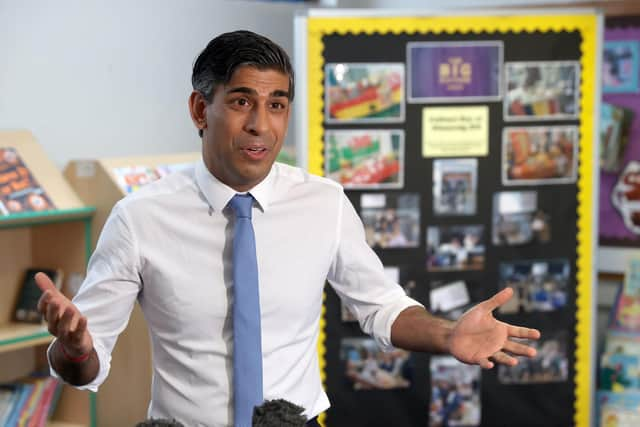For the sake of the party, Rishi Sunak must not hold back in calling for an election he is going to lose - John McLellan
Sir Keir Starmer has had a tough few days, with the Rochdale antisemitism row, continued division and uncertainty over its Gaza position, and the scrapping of the £28bn green investment pledge, but none of it will make much, if any, difference to the consistent 20 point lead over the Conservatives Labour has enjoyed for months.
As last week proved, Mr Sunak’s problem is that for every difficulty his opponents encounter, his are worse because his decisions are for real and the effect demonstrable, like Thursday’s Office of National Statistics data showing gross domestic product (GDP) contracted by 0.3% in the last quarter on 2023. The second consecutive squeeze put the UK officially into a technical recession, but mild or not doesn’t matter when growing the economy is Number Two on Mr Sunak’s list of five priorities. All voters will hear is “recession” because it chimes with their household budgets.


Advertisement
Hide AdAdvertisement
Hide AdLabour bickering is still largely in the realms of abstract policy debate and for all the lack of any public enthusiasm for the leader, the party still romped home in last week’s two by-elections. The monster Find Out Now/Electoral Calculus opinion poll of 18,000 voters for the Daily Mirror predicted the General Election could see the Tories reduced to as few as 80 MPs, a near-extinction event which could give Labour a platform for two or even three terms in power. Experienced Conservative analysts don’t think the election result will be so catastrophic, even with Reform, but it reframes the way they view the election, where anything over 200 seats will be regarded as reasonable return. Public talk of there still being everything to play for, which echoes Rushi Sunak’s defiant rhetoric in the 2022 leadership campaign when it was clear he was going to lose, is only a brave face on private acceptance of the inevitable.
Minds are now focusing of the aftermath of defeat and limiting losses to retain a platform for a successful 2029 election campaign, as reflected in the leading article in last week’s Spectator magazine. Previous speculation focussed on whether this election will be like 1992, when John Major came from behind to win, or the 1997 Labour landslide, but now comparisons are being drawn with 2005, when Michael Howard aimed for 200 seats from the rump of 165 left in 1997, only improved by one under William Hague in 2001. “The Red Wall has gone, so the aim now is to hold traditional Tory seats so there is a platform for what comes afterwards,” said a source. “The polls were already tightening in 1992, and that’s not happening,” said another.
For some, a spring election still regarded as the best option in an impossible position, even though the poor GDP figures appeared to rule that out, the argument being that Chancellor Jeremy Hunt needs time for tax cuts, and anything else he can conjure, to take effect. But this too is being dismissed as wishful thinking, not least because the room for impactful tax reductions shrank along with the GDP. “There is no point in hanging on in the hope that something will turn up, because only bad things will happen,” said one senior figure. That certainly applies to Mr Sunak’s fifth pledge, to stop the boats of illegal immigrants crossing the Channel. “That’s another f*** up,” said another source. “Does anyone really think that even if he does manage to get three people on a jumbo jet to Rwanda, that the boats will stop coming?” he said. “If they are prepared to risk drowning in the Channel, a plane to Rwanda isn’t going to put them off.”
With the English council elections in May and another tough night in store, Conservative Campaign Headquarters is on election footing, with ministers told to forget about civil service meetings and instead to get out to key constituencies, and that will include the Scottish seats in the South and North East where doorstep returns indicate the party is still regarded as the main opposition to the SNP. “It’s almost a separate election in Scotland,” said one seasoned campaigner, who dismissed the Mirror poll prediction that the SNP would hold 40 seats and the Conservatives none. “We’re in a very different position to what’s happening in England, and I don’t think the poll picked that up. Up here it’s clear this election is as much about the SNP, but a split Unionist vote could cost us.”
Scottish Labour’s mixed messages about tax and oil and gas may yet prove crucial in those Conservative-held seats, where Anas Sarwar’s embracing of tax cuts is in sharp contrast with the tax-the-rich positions of the very recent past. Labour sticking with plans for a windfall tax on energy companies might go down well in Glasgow, but less so in Aberdeen where thousands of jobs depend on confidence in the North Sea. Scottish Conservative canvassing returns in key constituencies indicate support remains solid. “The SNP tails are down, Labour lack boots on the ground, and there is little sign of Tories sitting this one out because of Boris Johnson or Liz Truss,” said another well-placed campaigner. If the 18 per cent backing recorded by Redfield & Wilton earlier this month was matched on the day, the number of Scottish Tory seats could rise to nine from six. But the 14 per cent indicated by Ipsos three weeks ago could mean just one or two, and there are growing fears that a late election just increases the chances of such a slump.
“We are not going to win,” said a source, “so the Prime Minster has a duty as leader to do what’s right for the Conservative Party, and not hang on just for a few more months in Downing Street.”